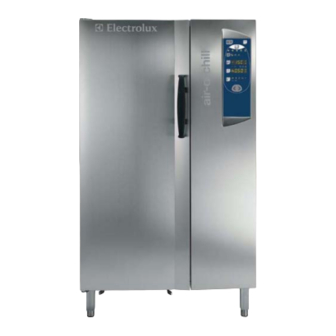Electrolux AOFP102U Manuale di istruzioni per l'uso e la manutenzione - Pagina 12
Sfoglia online o scarica il pdf Manuale di istruzioni per l'uso e la manutenzione per Congelatore Electrolux AOFP102U. Electrolux AOFP102U 27. Bcf 30kg 6 gn1/1 lw (240/3/60hz), bcf 50kg 10 gn1/1 lw (240/3/60hz) / bcf 100kg 20 gn1/1 lw (240/3/60hz) / bcf 70kg 10 gn2/1 lw (240/3/60hz) / bcf 180kg 20 gn2/1 lw (240/3/60hz) / bcf 30kg 6 gn1/1 lw (208/3/60hz) / bcf 50kg 10 gn1/1 lw (208/3/60hz) / bcf

C.1.4 PROGRAMS
Press the
button to set the appliance for programs
mode. The appliance switches from standard cycle selection
mode to program mode and vice versa.
From left to right:
- Turbo cooling
- Program P1
- Program P2
Associated with each standard cycle are 2 default programs that
can be varied by the user.
What is a program? For chilling, the user can change both the
chamber temperature and the chilling time and save the changes
in the memory for subsequent retrieval, and for maintenance the
user can set the chamber setpoint.
C.1.4.1 Chilling with "turbo cooling"
The "turbo cooling" cycle allows the user to operate the unit at
temperature between -32,8°F (-36°C) and +37,4°F (+3°C). The
unit runs a cycle continuously and defrosting is managed
automatically.
To select this type of cycle, refer to paragraph C.1.4.
C.1.4.2 Cycles for ice cream
By enabling the parameter "EICE" (EICE = y), the machine is
set up to run two ice cream cycles. Programmes "P1" and "P2"
are disconnected from the normal logic and become two
specific cycles for ice cream. They are no longer assigned to
the selected standard cycle. When this cycle is selected, the
LEDs for the standards cycles are off.
• cycle "P1": time-controlled or shaft probe-controlled chilling.
After chilling, the machine switches over automatically to
conservation at a temperature of 6,8°F (-14°C).
• cycle "P2": "turbo cooling" chilling with a cell temperature
of 3,2°F (-16°C)
N.B.: to modify the "EICE" parameter, refer to paragraph
C.1.9.5.
C.1.5 TEMPERATURE
The temperature display can display both the chamber tempe-
rature and the food (core) probe temperature.
If a cycle is running (i.e. positive or negative maintenance, timed
positive blast chilling or timed freezing), the temperature
displayed is the chamber temperature.
If a food (core) probe cycle is running, the food (core) probe
temperature will be displayed by default.
Press the
button in chilling cycles to switch between
chamber temperature and food (core) probe temperature.
The indicator light shows which of the two temperatures is being
displayed at that time:
- if the food (core) probe temperature is displayed, the FOOD
CORE PROBE TEMPERATURE INDICATOR LIGHT switches
on
- if the chamber temperature is displayed the CHAMBER TEM-
PERATURE INDICATOR LIGHT switches on
Only one or the other can be enabled at one time. Both will not
active at the same time.
C.1.6 ALARM WARNING
The following indicator lights light up when an alarm occurs:
When an HACCP alarm occurs, the indicator light
1- blinks continuously if the alarm is current. To
check the type of alarm, scroll to the utility section
(§ C.1.9) with the keys.
2- stays on continuously if the alarm has ended but
must still be addressed by the user.
When a service alarm occurs, the indicator light
1- blinks continuously if the alarm is current. To
check the type of alarm, scroll to the utility section
(§ C.1.9) with the keys.
2- stays on continuously if the alarm has ended but
must still be addressed by the user.
The type of alarm can be displayed by using the "Utilities menu"
functions (see sections C.1.9 for an explanation of the Utilities
menu, and section C.4 for instructions on how to display the
alarm types and descriptions of the alarms).
C.1.7 STANDARDS
The Standard indicator light is normally off. It lights up only when
the Reference Standard option is entered with the UTILITIES
button.
From left to right, the lights are: Electrolux Food Safe Mode 1,
Electrolux Food Safe Mode 2, U.S. Standard .
To display the appliance Standard setting, use the "Utilities
menu" functions (see sections C.1.9 and C.1.9.4).
12
